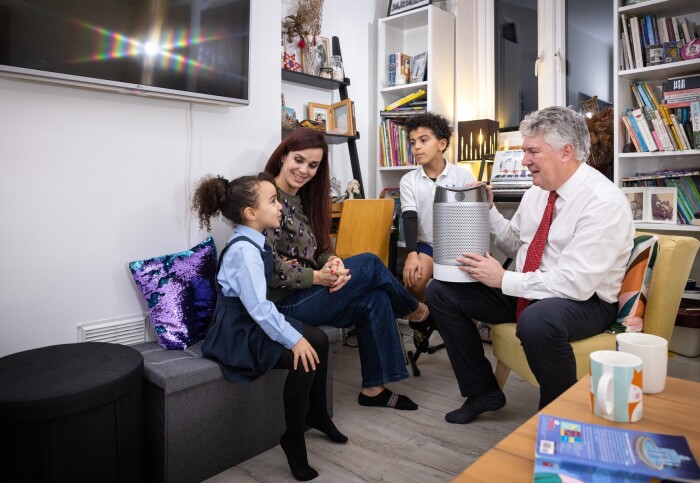Imperial experts to study air pollution exposure inside 100 London homes

A groundbreaking Imperial-led study is looking at indoor exposure to air pollution in more than 100 homes in West London.
The WellHome study, led by Imperial College London’s world-leading Environmental Research Group, is a first-of-its-kind community-based study focusing on assessing air quality inside and outside of homes, as well as identifying various contaminants such as chemicals, biological agents, and microplastics that are present within the home environment.
The research will provide key data that could inform health guidance, policymaking and personal behaviour.
Researchers will install air quality sensors in participants’ homes over two 28-day measurement periods – one during a warm period (in spring or summer) and another during a cold period (in autumn or winter). These sensors will measure particles, gases, temperature, and humidity. Comparing the data over different periods will help the researchers understand how changing seasons impact indoor air quality.
The researchers will also use passive samplers to capture chemicals, biological particles like pollen and mould, and microplastics as they slowly settle out of the air.

- If you live in West London and are interested in taking part in this study, please watch this two minute video and complete the short expression of interest form here.
- If you have any questions about the information sheet and/or the pre-registration form, please get in touch via email wellhome@imperial.ac.uk or via phone, text or WhatsApp on 07596955261.
Although we spend most of our lives indoors, the vast majority of research on air pollution is based on measurements of pollutants outdoors. The researchers behind the WellHome study say it is important to improve our understanding of how air pollution behaves inside homes, where it comes from and how harmful it is.
“Although we are affected in different ways, air connects us all... I'm excited to see the positive impacts we can collectively make in West London, working with those most affected and traditionally excluded.” Esther Lie WellHome Local Community Engagement Coordinator
It is hoped that the findings of the study will lead to effective recommendations for households, public authorities, and policymakers to help create healthier home environments.
Professor Frank Kelly, Director of the Environmental Research Group (ERG), said: “Overwhelming evidence exists that shows exposure to outdoor air pollution is associated with a range of health impacts, including asthma exacerbation, bronchitis, heart attacks, and increased susceptibility to respiratory infections, with the burden of these health effects falling heavily on underserved and marginalised communities.
“Although less studied to date, indoor air pollution is gaining attention as a potential source of health effects, particularly given that we spend 80-90 per cent of our lives indoors. To better understand the sources of indoor pollutants and their potential health effects, the Environmental Research Group is undertaking the WellHome study.”
The list of pollutants that the researchers will be looking for include nitrogen dioxide (NO2), particulate matter (PM), volatile organic compounds (such as chemicals from paints or cleaning products), carbon dioxide (CO2), carbon monoxide (CO), microplastics, and bioaerosols (such as pollen and mould).
A key area to study will be the connection between indoor air quality and conditions outside, as early data suggests that trends in outdoor air quality can affect air quality indoors.
Community focus
An important feature of the WellHome study is that it has been developed from the start with community groups in the White City district – an area where more than 50% of the population are from communities of colour, such as Somali and North African families, or are from low socio-economic backgrounds.
Dr Diana Varaden, Lecturer in Environmental Social Science and Health in the ERG, said: “Our WellHome families play an important and active role in the development of our research. They not only support our data gathering efforts, but they also play an active role in shaping the design of the research methods, ensuring that it aligns with their needs and experiences.
“In due course, we will together co-design our results dissemination strategy, ensuring that the results are meaningful and accessible to all stakeholders.”
"[Our WellHome families] not only support our data gathering efforts, but they also play an active role in shaping the design of the research methods, ensuring that it aligns with their needs and experiences." Dr Diana Varaden Environmental Research Group
It is hoped that this research will help lay the groundwork for further collaboration between the Environmental Research Group, which is based at Imperial’s White City Campus, and communities in West London.
Esther Lie, Community Engagement Coordinator for WellHome, said: “I'm lucky to be working on the WellHome study, especially with our knowledgeable Community Ambassadors, partners and, of course, local families. The WellHome study puts principles of environmental justice into practice, paving the way for research like this to be the norm.
“Although we are affected in different ways, air connects us all. This project uniquely supports and strengthens the community, improves the health of local people, and tackles the climate and ecological crisis in an accessible and tangible way. I'm excited to see the positive impacts we can collectively make in West London, working with those most affected and traditionally excluded.”
WellHome is also particularly interested in the health of children, who are more vulnerable to the effects of poor air quality – especially if they have asthma or allergies. The researchers aim to use the study’s findings to better understand how indoor air quality affects children with respiratory illnesses and what measures can be taken to mitigate this effect.
Results from WellHome are expected to be published at the end of 2024.
Article text (excluding photos or graphics) © Imperial College London.
Photos and graphics subject to third party copyright used with permission or © Imperial College London.
Reporter
Conrad Duncan
Communications Division